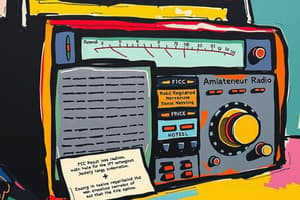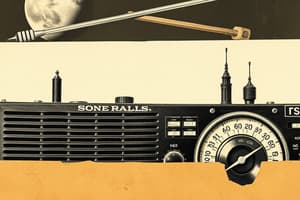Podcast
Questions and Answers
Which of the following is part of the Basis and Purpose of the Amateur Radio Service? (Select all that apply)
Which of the following is part of the Basis and Purpose of the Amateur Radio Service? (Select all that apply)
- Advancing skills in the technical and communication phases of the radio art (correct)
- All these choices are correct
- Providing communications for international non-profit organizations
- Providing personal radio communications for as many citizens as possible
Which agency regulates and enforces the rules for the Amateur Radio Service in the United States?
Which agency regulates and enforces the rules for the Amateur Radio Service in the United States?
- The FCC (correct)
- Homeland Security
- All these choices are correct
- FEMA
What do the FCC rules state regarding the use of a phonetic alphabet for station identification in the Amateur Radio Service?
What do the FCC rules state regarding the use of a phonetic alphabet for station identification in the Amateur Radio Service?
- It is encouraged (correct)
- All these choices are correct
- It is required when transmitting emergency messages
- It is required when in contact with foreign stations
How many operator/primary station license grants may be held by any one person?
How many operator/primary station license grants may be held by any one person?
What proves that the FCC has issued an operator/primary license grant?
What proves that the FCC has issued an operator/primary license grant?
What is the FCC Part 97 definition of a beacon?
What is the FCC Part 97 definition of a beacon?
What is the FCC Part 97 definition of a space station?
What is the FCC Part 97 definition of a space station?
Which of the following entities recommends transmit/receive channels and other parameters for auxiliary and repeater stations?
Which of the following entities recommends transmit/receive channels and other parameters for auxiliary and repeater stations?
Who selects a Frequency Coordinator?
Who selects a Frequency Coordinator?
What is the Radio Amateur Civil Emergency Service (RACES)?
What is the Radio Amateur Civil Emergency Service (RACES)?
When is willful interference to other amateur radio stations permitted?
When is willful interference to other amateur radio stations permitted?
Flashcards are hidden until you start studying
Study Notes
Basis and Purpose of Amateur Radio
- Advancing skills in the technical and communication phases of the radio art is a key part of the purpose of the Amateur Radio Service.
Regulatory Agency
- The Federal Communications Commission (FCC) is the agency that regulates and enforces the rules for the Amateur Radio Service in the United States.
Phonetic Alphabet Usage
- The use of a phonetic alphabet for station identification in the Amateur Radio Service is encouraged by FCC rules, especially during communications.
License Grants
- Individuals may hold only one operator/primary station license grant at a time.
License Verification
- An operator/primary license grant is validated by the license appearing in the FCC's Universal Licensing System (ULS) database.
Definition of a Beacon
- An amateur station transmitting communications for the purpose of observing propagation or related experimental activities is classified as a beacon under FCC Part 97.
Definition of a Space Station
- A space station is defined as an amateur station situated more than 50 km above the Earth's surface.
Frequency Coordination
- Recommendations for transmit/receive channels for auxiliary and repeater stations come from a Volunteer Frequency Coordinator recognized by local amateurs.
Selection of Frequency Coordinator
- Frequency Coordinators are chosen by amateur operators in a local or regional area eligible to operate repeater or auxiliary stations.
Radio Amateur Civil Emergency Service (RACES)
- RACES is a radio service that utilizes amateur frequencies for emergency management and civil defense communications, involving certified amateur operators.
Willful Interference Policy
- Willful interference to other amateur radio stations is prohibited at all times, ensuring communication integrity.
Technician License Frequency Ranges
- Various frequency ranges are designated for phone operation by Technician licensees, including specific bands allocated to their privileges.
Studying That Suits You
Use AI to generate personalized quizzes and flashcards to suit your learning preferences.




